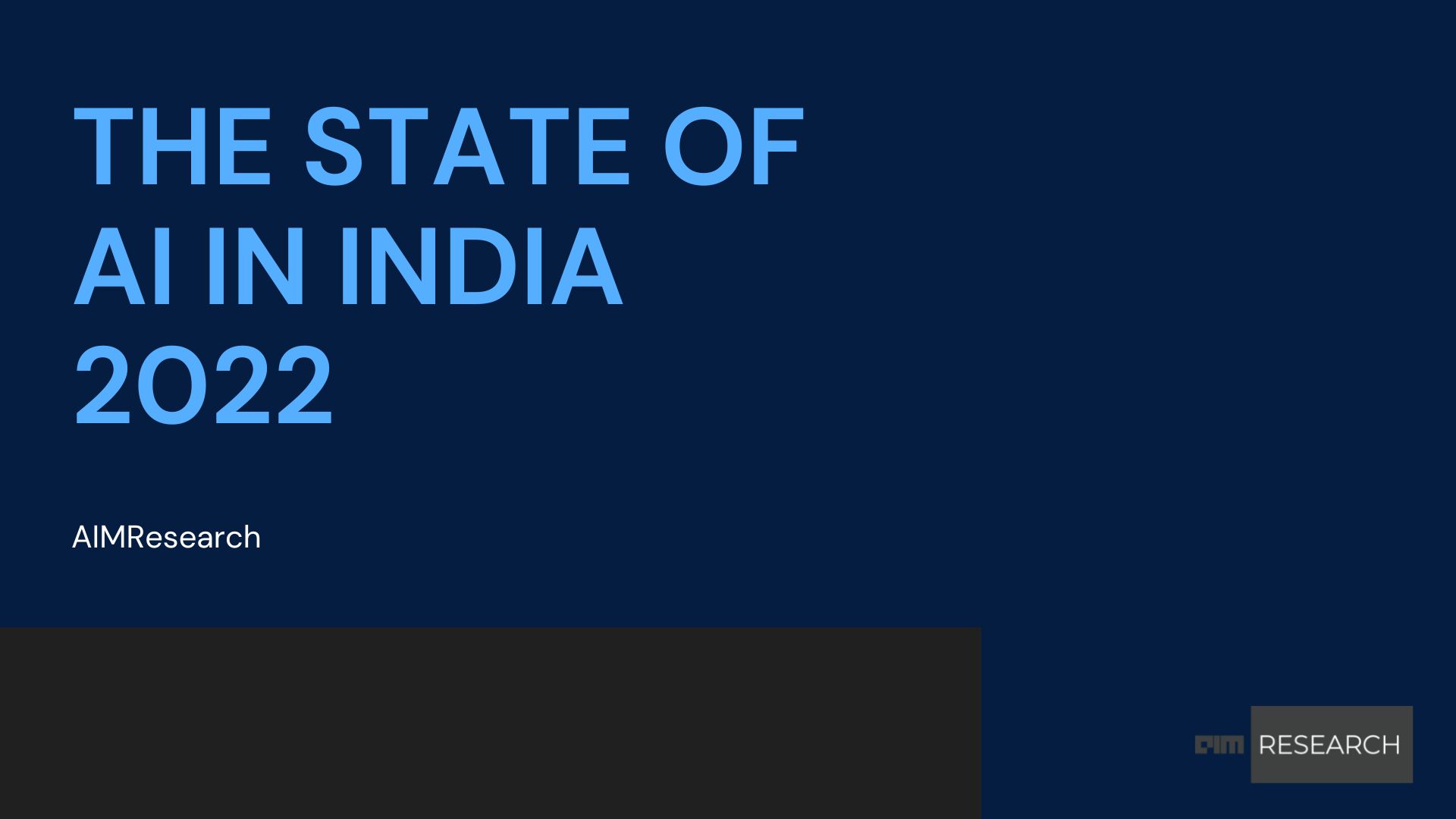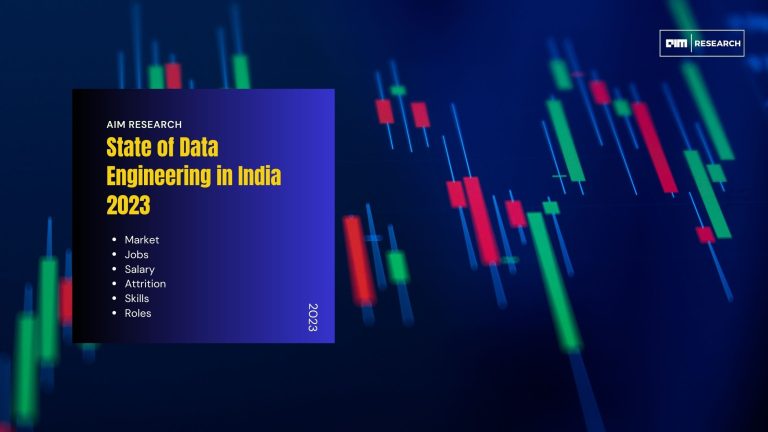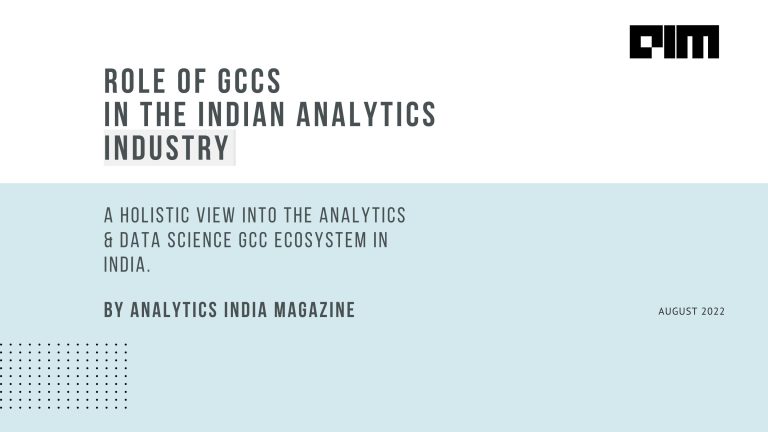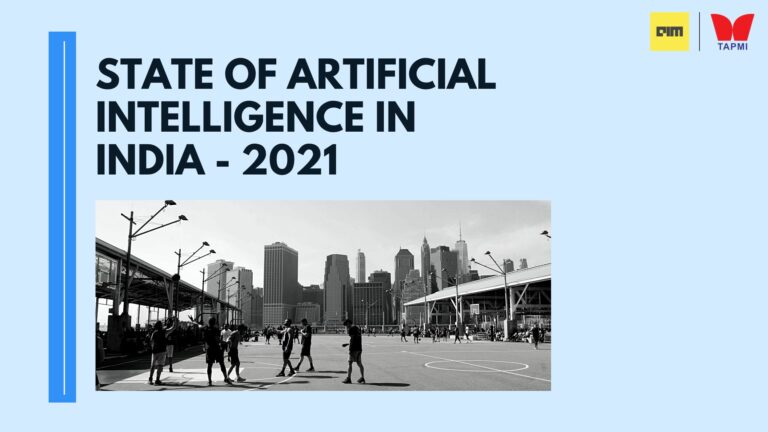|
Listen to this story
|
Over the last few years, AI has evolved to become a key driver of Industrial Revolution 4.0. India has a significant stake in the development of AI, with its potential being progressively unleashed in terms of investments, talent and growing market size.
This report presents a comprehensive overview of the State of AI in India. Along with the usual metrics like the overall size of the AI market and its projected growth rate, a key highlight in this report is the state of AI adoption across sectors in India. The report also includes the extent to which different AI capabilities and use cases that have been adopted in India. Additionally, the report talks about the AI talent scenario in India, focusing on the skillset, experience and job opportunities available for AI professionals.
You can read previous years’ reports at the links below:

1. Indian AI Market
In this section, we present an overview of the Indian AI market — its present size, sectoral composition, growth rate and projection for the near future.
1.1 Indian AI Market Projection

12.3 bn
AI-generated revenue in India in 2023 stands at USD 12.3 billion in 2022.
42%
Indian AI market size is predicted to grow at a CAGR of 42% in 2022.
71.0 bn
AI market size in India is expected to grow to USD 71.0 bn by 2027.
The AI market is steadily increasing in India, driven by strong IT infrastructure, a rich data economy and the large-scale investments that government and corporates have been making towards digitalisation.
In the years to come, the AI market is all set to grow further, driven by the increasing use of cloud-based applications and ever-expanding benefits being realised from AI-driven decision-making.
1.2 Market size by type of sector


3/5
Big IT companies or KPO/BPO service providers make up 3/5th (60.0%) of the total AI market in India.
23%
Non-IT sectors make up 23% of the total AI market share in India.
28%
BFSI holds a market share of 28% among all the non-IT sectors in India.
Consumer companies are increasingly adopting AI across different verticals, driven by the unleashing potential of various applications and use cases.
In the Manufacturing sector, robots are at the forefront of assembly lines to ensure the proper functioning of the entire production value chain. In addition, automated image recognition systems conduct quality checks, thereby enabling precision manufacturing.
1.3 Market size by company type

56%
56% of the AI market share in India is held by IT service providers.
22%
Consultancy firms account for 22% of the Indian AI market share.
IT providers continue to garner the first-mover advantage in terms of occupying the highest market share.
However, with the growth of low-code no-code platforms and increasing availability of analytics and business intelligence platforms, and a focus on building in-house capabilities, other players, like consultancy firms, GCCs, and domestic consumer firms, are likely to catch up to increase their share in the overall AI market.
1.4 Niche AI players in India across sectors

2. AI Adoption among Indian enterprises
The section presents the adoption of AI and its use cases across sectors in India — the share of AI professionals across Indian enterprises, the extent and the stage of AI adoption by different sectors.
2.1 Share of AI professionals among Indian enterprises

4.1%
In 2022 the share of AI professionals in mid to large Indian enterprises stands at an average of 4.1%
1.6pp
In 2022, the share of AI professionals as a percentage of total employees in mid to large-size companies increased by 1.6 percentage points.
One in eight (12.8%) of mid-to-large size organisations in India have employed a tenth of their workforce with AI professionals.

The share of AI professionals in non-IT Indian enterprises has been increasing steadily as these firms are hiring more and more AI professionals in-house to leverage AI in their operations and businesses in the backdrop of data becoming more central to strategic decision-making.
2.2 Share of AI professionals across sectors

5%
AI professionals account for 5.0% of the workforce strength in BFSI.
3%
In the Media & Manufacturing sectors, 3% of employees are AI professionals.
A high demand for automation combined with emerging technologies like IoT, digital twins, etc., that enable it has led traditional industries like Manufacturing & Production and Infrastructure & Transport to invest significant budgets in AI.
2.3 AI adoption across sectors

65%
At 65%, the BFSI sector shows the highest rate of AI adoption.
50%
Pharma & Healthcare accounts for 50% of AI adoption.
40%
The Retail & FMCG sector accounts for 40% of AI adoption.
With increasing digitisation, the risks of fraud in the BFSI sector have increased, and so have the concerns regarding data security and privacy. Apart from offering solutions for better customer experience and reduced operational costs, AI holds huge potential to address issues of fraud detection and data safety.
The adoption of AI in the Pharma & Healthcare sector is predominantly driven by the focus on preventive healthcare, drug discovery, and precision medicine.
2.4 Stage of AI adoption across sectors

Laggards
Enterprises that do not have any definite AI strategy but are currently hiring standalone (or no) AI professionals.
First stage adopters
Enterprises that have built a distinct AI vertical and deployed AI in at least one use case.
Early adopters
Enterprises that have a distinct AI vertical in place and have deployed AI in multiple use cases.
Leaders
Enterprises that have a holistic AI strategy that forms the core component of their business strategy.
Sectors such as Pharma & Healthcare and Retail & FMCG have a high share of Leaders and Early Stage adopters due to the existing digitisation within the ecosystem. This has enabled them to develop state-of-the-art applications that are able to solve complex real-world problems.
The share of BFSI First-stage adopters is high despite the digitisation as public-sector banks are catching up slowly on the AI hype.
2.5 AI capabilities among Indian enterprises

74%
More than 74% of Indian AI enterprises have adopted Deep Learning.
65%
Computer vision and RPA have been adopted by more than 60% of AI enterprises.
37%
37% of AI enterprises in India adopted knowledge graphs in their businesses.
The immense popularity of deep learning among AI enterprises is due to its ability to reveal hidden properties, patterns, and relationships within data that might not even be apparent to humans.
It has immense potential to execute multiple tasks with various data sources while reducing human interference. With the gradual unfolding of its efficiency, DL is set to penetrate further among all enterprises.
2.6 Adoption of AI use cases

13%
Service operations optimization is the most commonly adopted use case by enterprises.
12%
12% of enterprises have adopted AI for customer segmentation and customer acquisition.
10%
10% of enterprises are using AI for optimizing product features.
Among all use cases, Service operations optimisation is most popular among AI enterprises due to the immense business value it generates by enabling firms to strike the right balance between retaining customers while at the same time optimising resources and maximising productivity.
3. Human Resource
This section deals with the overall AI talent scenario in India — skillset and experience that AI professionals possess, jobs available for them based on experience, geography and sector, and median salaries of AI professionals
3.1 Top skills AI professionals possess

72%
72% of AI professionals can interface with databases through basic query languages like SQL
2/3
Almost two in three (64.0%) AI professionals can work on or have a good understanding of Deep Learning
2/5
Two in five or 40% of AI professionals are skilled in Cloud Computing and Big Data
As the focus on scalable ML applications grows, the line between the roles of data professionals and software engineers will grow thinner. This will lead to more AI professionals that are able to use scripting languages.
A higher share of AI professionals will be proficient in building complex ML solutions like NLP, DL, CV, etc. An ability to build Conventional ML models like regression, decision trees, SVMs, etc., will become a must-have skill for a career in AI.
3.2 Share of AI professionals by years of experience

24%
AI professionals with 6-10 years of experience account for 24% of the AI workforce.
22%
AI professionals with 3-5 years of experience account for 22% of the AI workforce.
The formalisation of data science programmes leading to specialised UG/PG courses in Data Science is enabling younger professionals to take up careers in AI.
3.3 Share of open AI jobs across cities

31%
At 31%, Delhi holds the maximum share of jobs for AI professionals.
23%
Bangalore continues to bring more opportunities for technologists with 23% of open AI jobs hiring for roles based out of the city
Delhi is slowly becoming the hub for niche technology startups. MNCs are also opting to set up captives in the NCR region.
Good infrastructure, an efficient transport system, and proximity to the central government is attracting investment leading to a higher share of open AI jobs.
3.4 Share of open AI jobs across years of experience

47%
47% of jobs are posted for AI professionals who have 3-5 years of experience.
27%
27% of AI Jobs available are for those who have 1-2 years of experience.
18%
Interestingly, only 18% of the available jobs require AI professionals with 6+ years of experience.
While younger professionals are choosing AI careers, enterprises still prefer experienced folks, since the cost of upskilling and inducting freshers into teams remains high.
3.5 Share of open AI jobs across sectors

30%
BFSI accounts for 30% of the market share for open AI jobs across sectors.
22%
Health & Pharma accounts for 22% of the market share for the open AI jobs.
17%
17% of AI jobs currently open are in Manufacturing & Production.
A significant portion of BFSI enterprises, especially public sector banks, are in the early stages of AI adoption. This is leading to more jobs in the sector and demands professionals with good domain knowledge.

3.6 Median Salary of AI professionals across cities

17.8
City-wise median salary Mumbai (at a median of 17.8 lakhs per annum) pays the highest salaries to their AI employees.
13.2
Overall, AI professionals in India command a median salary of INR 13.2 lakhs per annum.
A higher cost of living keeps Mumbai at the top as AI professionals in the city command the highest salary at INR 17.8 lakhs per annum.
















































































